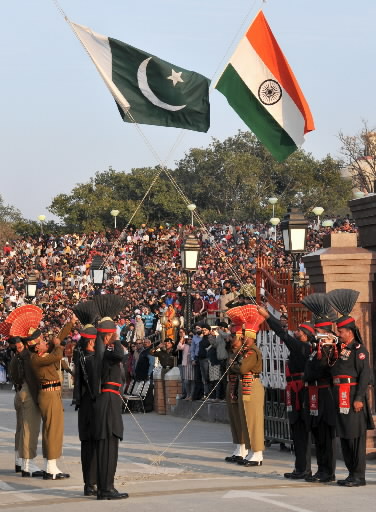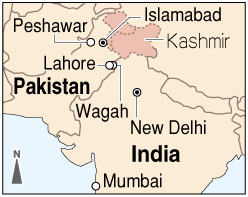Nuclear weapons can be eliminated: Chapter 2, Part 5
Apr. 20, 2009
Chapter 2: South Asia’s cold war
Part 5: Curbing hostilities
by Junichiro Hayashi, Staff Writer
Trust between India and Pakistan quickest route to abolition
Every day on the India-Pakistan border the same scene unfolds as border guards from the two nations stand on either side and lower their nations’ flags at dusk.
In the town of Wagah on the Pakistani side, cries of “Pakistan is great!” and “Superpower, Allah!” could be heard from the tourists, drowning out the cheers of those on the Indian side. This battle of national pride continued until the sun went down about 30 minutes later.
Zahid, 26, a teacher who had come from Peshawar in northwest Pakistan, said brightly, “There is no chance of either country using its nuclear weapons because of the terrible destruction that would result.” Other young people also said that nuclear weapons can not be used.
About 30 kilometers west of Wagah is the city of Lahore. As he gazed at flames flickering in a fireplace, Nasir Akhtar, 67, a former lieutenant general in the Pakistan Army, said, “There is an urgent need to develop trust between India and Pakistan.” Mr. Akhtar has repeatedly stressed to the government the importance of abolishing nuclear weapons.
Since the partitioning of India in 1947, India and Pakistan have been in continual conflict over possession of the Kashmir region and other issues. Over the years they have gone to war over Kashmir two times. Mr. Akhtar, who was in the army when war broke out in both 1965 and 1971, displays on his desk a photograph of his 22-year-old brother, who was killed in the 1965 conflict. “Nothing can be gained by war,” he said. “And nuclear weapons will simply destroy the country.”
In 2000, after his retirement from the army, Mr. Akhtar formed India-Pakistan Soldiers’ Initiatives for Peace. He is head of the Pakistani contingent, which numbers about 100. The group has held meetings in both countries at which they discuss ways to find a peaceful settlement to the Kashmir problem and measures to prevent nuclear war.
Yogesh Kamdar, 57, a peace activist in Mumbai in western India, expressed similar concerns. “The abolition of nuclear weapons is our ultimate goal,” he said. “But first we have to improve relations between our two countries.” He believes that because Pakistan and India are now engaged in a cold war, improving relations between the two countries is the quickest way to nuclear abolition.
I asked Achin Vanaik, 62, a political science professor at the University of Delhi, whether or not it was conceivable for the two countries to abandon their nuclear weapons.
“Relations will improve when we respect each other,” he said. “If citizens can change the attitudes of their governments and build a true peace, war can be prevented and then nuclear weapons will, of course, no longer be needed.”
His conclusion was clear, but he stressed that in order for India and Pakistan to prevent further conflict and build a relationship of trust, both nations must pull their forces out of Kashmir and make South Asia a nuclear-free region.
(Originally published on March 24, 2009)
To comment on this article, please click the link below. Comments will be moderated and posted in a timely fashion. Comments may also appear in the Chugoku Shimbun newspaper.









